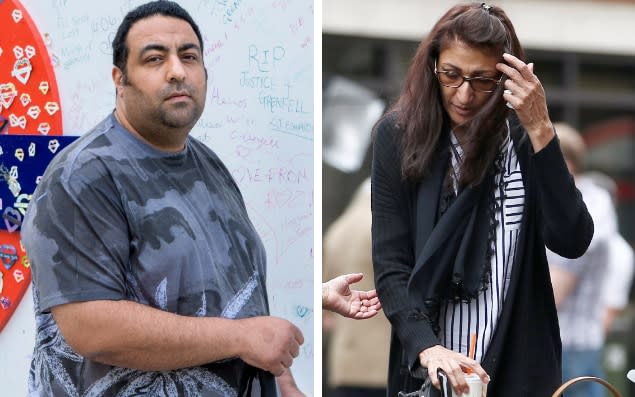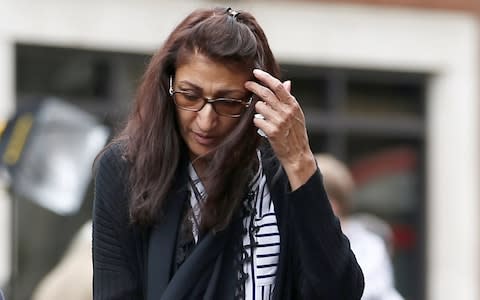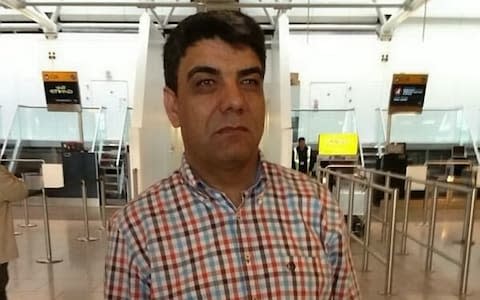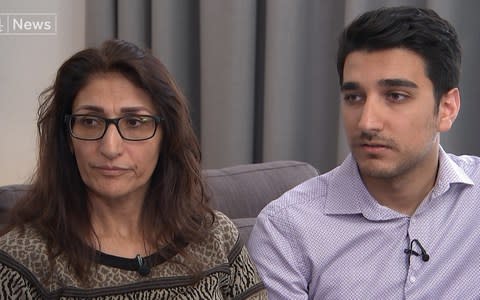The Grenfell Tower survivors: Lucky to escape, but living with the horror of what they saw

The haunting plight of those who lost their lives in the Grenfell Tower disaster is being heard daily at the inquiry into the fire.
But the victims stretch far beyond the 72 who were killed as a result of the blaze. The anguish of their friends and loved ones has been palpable as they pay tribute to the men, women and children whose time was cruelly cut short by the tragedy.
They are known as the survivors - those lucky enough to have escaped the fire alive - though their pain and suffering lives on.
As the chairman of the Grenfell Inquiry Sir Martin Moore-Bick prepares to examine how and why the disaster came to pass, here are their stories.
Flora Neda
Flora Neda can’t quite believe that, despite suffering a muscle wasting illness, she made it out of Grenfell Tower alive. Her husband, a former Afghan army officer who was fitter and stronger, didn’t.
Flora, 53 and her son Farhad, 25, were the only survivors from the top floor, the 23rd storey of Grenfell Tower. Around 2am, at a time when London Fire Brigade was still, according to reports, telling residents to ‘stay put’ and await rescue, Flora and Farhad took the decision to save themselves.
Saber Neda, 57, who ran a chauffeur business, delayed leaving flat 205, their home for the past 20 years. Four women from the floors below had sought refuge as the flames and smoke engulfed the building and Saber had remained behind to help those women, one of them frail.
Flora is convinced that had the building been evacuated immediately, the loss of life could have been greatly reduced. It is a key issue for the Grenfell Inquiry, and Sir Martin Moore-Bick, its chairman, to examine.

“If the fire brigade had evacuated straight away, everybody would have got out alive,” said Flora, the sadness etched on her face.
She spent five days in a coma in intensive care and a further two weeks in hospital suffering from the effects of smoke inhalation. Farhad had carried her on his back to safety.
“The fire brigade knew the fire is very huge and they could not control it. At least if they had told us you must save yourselves I am sure most other people would have been alive, in my opinion,” she said in comments that will inevitably upset firefighters who worked through the night, rescuing 67 Grenfell residents.
Saber, rather than be burnt alive, decided to jump from a window, plunging to his death. Before he did so, he made a last phone call, a recording of which was played at the opening of the Grenfell Inquiry this week. “Goodbye. We are now leaving this world. Goodbye. I hope I haven’t disappointed you. Goodbye to all.”

Flora is critical of the fire brigade’s ‘stay put’ policy. “We got out some time after two o’clock. It took us a long time to get down 23 flights. I have given my statement to the police. The organisation of the fire brigade was wrong.
“If we put the council, the cladding, the housing on one side, we still have to talk about the fire brigade on the other. This is very important to me.
“They should have done their duty to rescue the people or told people to get out. They have to accept the risk and the responsibility of their duty.”
Flora recalled what happened on the night although she recognises her timings are not precise. Her evidence is harrowing.
The family had returned home late from her sister’s just before fire broke out on June 14. “If we had been 10 minutes later this would not have happened to my husband. There was no fire and nothing to see when we got in. When we got up to the flat, the ventilation was making a very big noise. My husband was working early morning and he wanted to go to sleep but the noise was disturbing us. After about half an hour I opened the door to see if anybody was coming to fix the ventilator. When I did, I could smell something. It was like an electric wire burning and I came back.

“I went to go to sleep but something felt wrong. I didn’t go to bed because I was worried by the smell and the noise – and the lift was now not working. I opened the door again to the landing and saw my neighbour. She was a very young girl with her mum. They were running very fast.
“I saw them running down the stairs. I don’t know why they came back but they turned back. They didn’t survive.”
She went on: “At that time there was no smoke. I couldn’t see any fire. We didn’t call the fire brigade. We wanted to leave the flat but when we opened the door there was about 30 to 40 people coming from downstairs to upstairs. They were knocking on our door and screaming ‘there is a fire. Help help’.
“I asked them what happened and they said ‘there is fire and it is coming very quickly up’. I told them ‘why are you going up? There is no way out.’
“There was no smoke at that point. The fire was around the building but not inside.
“The people were coming from different floors. Four people came into our flat, two of them from the 18th floor. There were also two from the 22nd floor – a mother and daughter.
“We were now seven people in the flat. The rest of them went to flat 203. I don’t know how many bodies they recovered from there.
“Every minute Sakineh [one of the women] asked my husband where is the helicopter. My husband said ‘I don’t know’.
“My husband then called someone who said ‘they are saying stay where you are and the rescue is coming now’. At that time everybody stayed where they were.
“By now the corridor was full of smoke. The hallway was full of smoke. We went to open the windows but when we did the air circulated and smoke poured into the flat. We couldn’t see anything in front of our eyes.
“Then I said to my husband ‘if the fire is coming inside our sitting room I don’t want to burn and die. I want to jump out of the window’. My husband held me and said don’t be silly. We waited another 10 minutes maybe and then we decided it’s the time to escape.”
Saber stayed behind. “My husband was helping the women who had come into the flat,” recalled Flora. “He couldn’t leave those other four women in distress. Sakineh was also disabled; she was using a walker. She couldn’t get back down the stairs without any help. My husband stayed with them trying to help her.
“Farhad carried me on his back. We opened the front door and saw the smoke,” said Flora. She was hesitant to leave but her son persuaded her that it was their last chance. “He led me. We were coughing and vomiting. When we reached the staircase we couldn’t see anything.
“Maybe on the 18th or 19th floor we stepped over bodies. There was a person on the stairs breathing with difficulty but we couldn’t help them. We finally got to a floor where there was no smoke. We waited on that floor and then went back into the staircase and inside the smoke. We didn’t know what floor we were on. Maybe it was the 6th floor. We carried on down.”
She is not coping with the loss of her husband. “He was a very brave, courageous man. He couldn’t leave the other women behind. In the end he jumped out of the window. At least we had a body to bury.”
When she received his smoke-damaged clothes from police, she found a piece of his bone inside his jacket. “It was really upsetting. We had to have another burial. When I think of his pain and suffering it really hurts me. They didn’t tell us but I am sure that he saw there is no way, no chance of getting out. He didn’t have any choice and he doesn’t want to burn because at least they can find the body and bury the body, so he decided to jump. But it was too high. When I think about it, how could he manage to do that? My husband was very brave. He did it for us. Before he jumped he left a message.
“On the recording his voice is very nervous. He was scared. He left his message and after that he jumped. Nobody would have the courage to do that.”
Nabil Choucair
Nabil Choucair lost his mother, sister, brother-in-law and their three children – his three nieces – in the Grenfell inferno: three generations wiped out on the same night.
Nabil is deeply critical of the ‘stay put’ policy that remained in place, according to reports, for almost two hours. He has listened to recordings of frantic phone calls made to the fire control room by Bassem Choukair, his 40-year-old brother-in-law.
The family – Bassem, who worked for Marks and Spencer, wife Nadia Choucair, a teaching assistant in a local school, and their three children, Mierna, 13, Fatima, 11, and three-year-old Zainab – lived in flat 193. Sirria Choucair, 60, Nadia’s mother and the children’s grandmother, lived across the landing, in flat 191.
“I heard the voice calls. I heard the emergency calls,” explained Nabil.

“Our police liaison officers allowed us to hear the family’s calls. I could hear the emergency services [saying] stay put. Eventually they turned around and said try and get out. By then it was obviously too late. It was well past two o’clock. On the calls, we can hear Bassem’s voice. We can hear other members of the family in the background.
“You can hear the children. It’s not easy to listen to.”
He is convinced the policy should have been changed sooner. He recognises the huge problems caused by the cladding and the refurbishment of the tower but questions the evacuation policy as well.
“Without doubt they should have changed the ‘stay put’ order earlier,” said Nabil. “You have had somebody on the outside knowing what is going on and somebody inside obviously saying this fire is bigger than we can cope.
“The fire was getting bigger and bigger and they should have changed their strategy to tackle it.”
Nabil, who lives in east London and is married to Bassem’s sister – the families were particularly close as a consequence – said: “By 1.20am, 1.30am it was beyond control. There is no way they could tackle it at that height. Their strategy should have changed immediately. It was common sense, but they didn’t show it. I hold a lot of people responsible.
“I cannot say they would have survived. God takes a life when he wants to take a life. When your time is up, your time is up.”
Bassem made a series of calls to the emergency services, Nabil estimates as frequently as every five minutes. He then sent a text message to work at 1.20am, apologising that he was unlikely to be in the next day because of the fire breaking out in the tower.
“They [Bassem and family] were aware of the fire definitely by around 1.20am because my brother-in-law sent a text message to his workplace – he was a supervisor at a local M&S store – to say he wouldn’t be able to come to work and sorry. He was due in on the early shift and he sent a text saying sorry there is a fire in the flats and sorry I have let you down. M&S showed me the text that he sent.”

About 1.50am, his sister left Nabil a message on his phone. “It was just to say goodbye. It was a voice message to say ‘hi, there is a fire in the tower’,” he said.
Nabil went on: “They were under the assumption they would be rescued. There was a police helicopter but they thought it was a rescue helicopter. They kept asking send the helicopter so we can get in it and get out. All the time they thought they would be rescued.
“I understand and I do sympathise with the firefighters. I do hear from their side.”
The family had come to Britain from Lebanon in 1972 and Nabil, himself a father-of-three, took the bodies back for burial. They were a close-knit family and the cousins would see each other at least once a week. “They were so close. There was nothing we would keep from each other.”
He added: “Now I am looking for accountability and responsibility. People should come out and speak the truth about what happened on the night.
“It is as though it happened today. It is that fresh. They think you can move on and it is easy. But it’s not. They were just taken away from me just like that.
“No explanation. Not even a chance. It has destroyed us.”
Sepideh Moghaddam
Sepideh Moghaddam, a a single mother who walks with the aid of a crutch, watched the horror unfold having escaped the tower by 1am. She lived on the first floor, three floors below where the fire started.
“I woke up to the smell of smoke,” she said. “I just thought some toast was burning and I went back to bed. But the smell got stronger and I thought this is something serious.
“I went to the window and I could see the sky and I thought maybe the building next door was on fire.
“I went to the landing outside and saw my neighbours running. I went back in and grabbed my son and wrapped him in a blanket.”
She sat with her young boy on a grass verge, and even took a video at 1.30am of flames licking up the building. She recalled: “People were shouting, ‘Why aren’t you doing anything?’”
She claims to have seen larger fire engines with longer ladders unable to get close to the tower; their path blocked by smaller engines that had got there first. There was only one road in to Grenfell, a previous access road blocked off by building developments to improve the area. “They couldn’t get the little ones [engines] out of the way to let the big ones through,” she said.
“I heard someone ask [fire crews], ‘Why are you telling them to stay? Just tell them to go out’. [But] Most people were still in the building. They were crying and shouting and they told the fire brigade, ‘Why do you tell people to stay? Why don’t you tell them to go out’. The firemen were shocked too. Of course, it’s not just the fire brigade’s fault. There’s the council, the TMO [Tenant Management Organisation] but the fire brigade is very important. They could have saved more lives.

“Even the people who died on the side where the fire started and was spreading fastest could have been taken out,” she claimed. “It makes me feel quite sick and quite upset that the fire brigade [is] receiving awards.
“There is a lot of us who have these questions. Many of us are afraid to even speak about it.”
She fears a backlash and claims to have been shunned by others for voicing her concerns.
“Even now as I am talking to you I do feel afraid saying these things. I do feel scared. I am very grateful that my son is alive but when I think about those poor children who died, some younger than my son, that is what makes me stand up and say these things.”
Farshid Kaficheraghi
Farshid Kaficheraghi believes he was the second Grenfell Tower resident to make it out alive.
He lived in a flat on the 12th floor, the intensity of the fire demonstrated as Farshid produces a small plastic bag containing everything of his that remains from the disaster. There is a belt buckle; five coins too damaged to indicate their currency; a nail clipper; and the metal tip of a statue, caked in a layer of ash and dust.
Farshid, 46, who lived in flat 91 and ran a juice bar, heard the sirens and immediately went outside to check on a car he had borrowed. There he bumped into the resident in whose flat on the fourth floor the fire had started after a fridge-freezer caught alight.
“It was just before 1am,” he recalled, “I could see smoke coming from the fourth floor. There was no fire. I was standing outside smoking a cigarette and I noticed a man running up and down without any shoes. He was on his own so I asked him if the fire was in his flat. He said that ‘yes’, he’d been asleep with his wife and he heard an explosion sound and he’d called the fire brigade.
“It looked like he’d panicked and ran out of the house. I was thinking to myself where’s his wife – then his wife came out with a huge packed suitcase.”
Farshid believes that was about 15 or even 20 minutes after he had left the building. “There were four big fire engines there by this time but they were all standing around and looking like they were waiting for orders,” he said. “It must have been about 1.20am, maybe 1.30am when you could actually see the flames.”
Farshid said: “The fire brigade didn’t do their job at the beginning. Their [residents’] friends and families were calling and telling them to get out and they were saying ‘no’ – we have been told by the fire department to stay inside. Anybody who listened died; anybody who didn’t survived. Everybody would have survived if the fire brigade had evacuated the building immediately when I left the building.

“I saw everything. The police have taken statements from me. Everything I said has been backed up by CCTV footage. I have spoken to the police four times. They have taken 10 hours of interviews. You have to ask… why did you not evacuate the building? It is always on my mind. They were screaming in their flats.
“I am worried the inquiries will not properly investigate the fire brigade. I am not saying the construction of the building or the role of the council is not important but… questions need to be put to the fire brigade.
“We watched people burn in front of our eyes. Our friends and neighbours. People lost their family members. All our homes burned and we have nothing left, we’re ill and have terrible trauma and are sick.
“Everything from my life is gone. They gave me this small plastic ziplock bag. That’s all I have left. So I have nothing left to lose and I will speak the truth.
“The whole entire team who were in charge that night should be sacked.”

 Yahoo News
Yahoo News 
